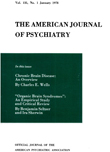A Clinical Syndrome and EEG-Sleep Changes Associated with Amino Acid Deprivation
Abstract
Sleep studies and psychiatric examinations were made on three patients with inoperable malignancies whose illnesses were being managed with an experimental low phenylalanine-tyrosine diet. There was a systematic reduction of REM sleep, supporting the findings of Jouvet suggesting that norepinephrine (a metabolic product of phenylalanine and tyrosine) has a role in the maintenance of REM sleep. The patients developed a reversible clinical syndrome manifested by indifference to their environment, lethargy, and impairment of long-term memory.
Access content
To read the fulltext, please use one of the options below to sign in or purchase access.- Personal login
- Institutional Login
- Sign in via OpenAthens
- Register for access
-
Please login/register if you wish to pair your device and check access availability.
Not a subscriber?
PsychiatryOnline subscription options offer access to the DSM-5 library, books, journals, CME, and patient resources. This all-in-one virtual library provides psychiatrists and mental health professionals with key resources for diagnosis, treatment, research, and professional development.
Need more help? PsychiatryOnline Customer Service may be reached by emailing [email protected] or by calling 800-368-5777 (in the U.S.) or 703-907-7322 (outside the U.S.).



